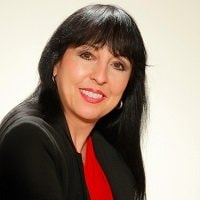This is Ileana Piña, from Montefiore Einstein Medical Center in New York. I am here at the American Heart Association (AHA) annual sessions in Chicago. It has been a very exciting meeting—in the exhibitors, the abstracts, the posters, and some very interesting late-breaking trials.
I want to tell you about two specific programs. One is from the AHA Council on Clinical Cardiology. We have been hosting high-school students from minority groups and underserved populations for the past 3 years. This is our third program. We had 86 high-school students yesterday from local Chicago schools, where their teachers put in applications to have them come.
The purpose of this program is to get them enthused about science and to show them that science can be obtained in many ways. We had some of our own volunteers telling stories about how they got to where they are. These are very important messages to students: that we were not born with silver spoons in our mouths, and some of us travelled some very tough and long tracks to get here. We left them with some good messages. We took them to a CPR class and taught them hands-only CPR. A funny generational difference is that they did not know who the Bee Gees were; the music that guides the pumping is from Saturday Night Fever (the track is "Stayin' Alive"). We also took them to the posters to chat with some of the investigators about the science they were doing; the posters included pharmacy, nursing, psychology, psychiatry, and cardiology.
The major messages were to dream big and work hard. You are allowed to dream as big as you want, but to get there you are going to have to work for it. There is no free lunch. That was one program that we were very excited about, and I wanted to share it with you.
Dick Cheney
The second one was our former Vice President, Dick Cheney, who came to talk. What was most remarkable about his presentation was the importance of his relationship with his doctors. Let me remind the audience that even during the days of 9/11 and the early days of the Iraq war, Dick Cheney had an implantable cardioverter-defibrillator. He has been dealing with heart disease since he was 37 years old, in the form of premature coronary disease and arrhythmias. I remember, in the news media, that we would hear about each time he would have some kind of an event.
As he got sicker, he ended up with a left ventricular assist device (LVAD), which pumps the left side of the heart. Hopefully, in the future we will have more blogs about this, because there are so many more LVADs being implanted all over the country that they merit their own time.
He has now undergone heart transplantation; it has been about 2 or 3 years. He emphasized his relationship with his doctors, and it brings us back to the trust and back-and-forth that we share with our patients. Certainly, heart failure patients are very sick and they entrust us with their lives, to offer them decisions that could be lifesaving. But it is sometimes very scary, and having that trust helps them make the right decision.
Let's not forget that. That is one of the blessed gifts that we are given as healthcare providers. Let's not ever falter on that. Have a great day. Ileana Piña, signing off.
© 2014 WebMD, LLC
Cite this: Sharing the Gift of Knowledge, Cherishing the Gift of Trust - Medscape - Dec 22, 2014.












Comments